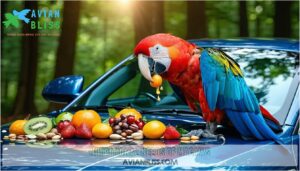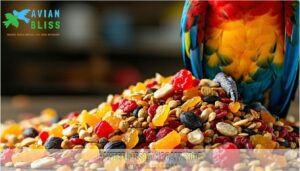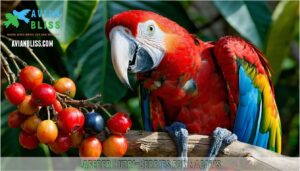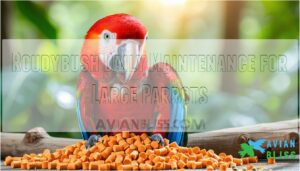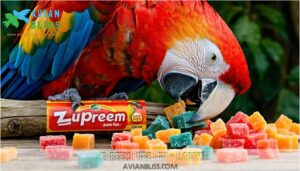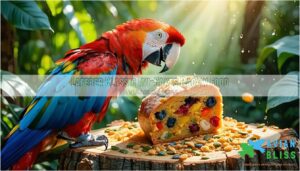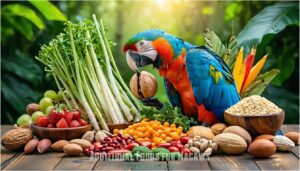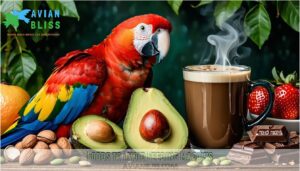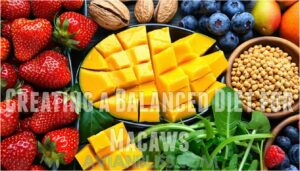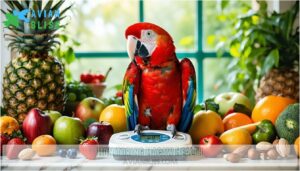This site is supported by our readers. We may earn a commission, at no cost to you, if you purchase through links.
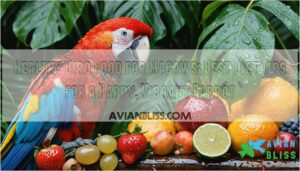
Start with high-quality pellets, which should make up 60-70% of their meals.
Add variety with fresh fruits (like apples or mango), vegetables (carrots, broccoli), and grains such as quinoa or brown rice.
Toss in some nuts and seeds as treats, but keep them limited since they’re calorie-dense.
Avoid processed foods, alcohol, chocolate, and anything salty – they’re dangerous for your feathered friend.
Don’t forget fresh water daily; hydration matters too!
A balanced diet keeps your macaw’s feathers bright and their mood cheerful.
Curious about perfect treats and toppers? Read on!
Table Of Contents
- Key Takeaways
- Nutritional Needs of Macaws
- Complete Diets for Macaws
- Healthy Treats and Toppers for Macaws
- Additional Foods for Macaws
- Foods to Avoid Feeding Macaws
- Macaw Habits and Biology
- Creating a Balanced Diet for Macaws
- Monitoring Macaw Health
- Tailoring Diets to Macaw Life Stages
- Consulting With an Avian Veterinarian
- Frequently Asked Questions (FAQs)
- What is macaw’s favorite fruit?
- What not to feed a blue and gold macaw?
- What do macaws eat in captivity?
- How often should I feed macaw?
- What is the healthiest food for macaws?
- What vegetables are safe for macaws?
- What is a macaws favorite fruit?
- How often should fresh food be replaced?
- What are safe kitchen table scraps for macaws?
- Can seasonal fruits be part of their diet?
- Conclusion
Key Takeaways
- Focus on a balanced diet with 60-70% high-quality pellets, fresh fruits, veggies, and occasional nuts and seeds for variety.
- Avoid harmful foods like avocado, chocolate, caffeine, and anything salty or processed, as they’re toxic to macaws.
- Fresh water is essential—change it daily and clean the bowls to keep it safe and bacteria-free.
- Monitor your macaw’s health by checking weight, feather condition, and droppings, and adjust their diet as needed with vet advice.
Nutritional Needs of Macaws
Your macaw needs a mix of vitamins, proteins, and fresh water to stay healthy and energetic.
Think of it like fueling a sports car – the right nutrients keep them vibrant and ready to play!
Essential Vitamins and Minerals
A balanced diet is essential for macaw nutrition, supporting their health and happiness.
Don’t skip these essentials:
- Calcium sources: Strengthen bones, especially during egg-laying.
- Vitamin A benefits: Boost immunity, feathers, and vision.
- Mineral supplements: Fill gaps, avoiding deficiency symptoms.
Ignoring these macaw vitamins and minerals could leave your feathered friend feeling less than fabulous!
Keep Polly thriving!
Protein Requirements
Protein is the secret sauce behind your macaw’s strength and feather brilliance.
Quality proteins like eggs, tofu, fish, and even plain yogurt keep your bird active across all life stages.
Without enough protein, macaws risk protein deficiency, affecting growth and energy.
| Protein Source | Benefits | How to Serve | Frequency |
|---|---|---|---|
| Eggs | Muscle growth | Cooked, no seasoning | Once weekly |
| Tofu | Plant-based protein | Cut into small cubes | 1-2 times/week |
| Fish | Omega-3 rich | Well-cooked, deboned | Monthly |
| Yogurt | Calcium, probiotics | Plain, unsweetened | Rare treat |
The benefits of these protein sources include muscle growth, plant-based protein, Omega-3 rich fish, and calcium and probiotics from yogurt.
Importance of Fresh Water
A healthy macaw isn’t just about great macaw food – staying hydrated is just as essential! Fresh water keeps their body functioning and supports macaw nutrition. Without it, dehydration risks sneak in and can impact macaw health fast.
Keep an eye on water quality because your bird deserves a clean, safe drink! Daily bowl hygiene is non-negotiable, so swap out stale water and give the dish a good clean.
Notice your macaw’s drinking behavior, too – some sip regularly, while others prefer quick gulps.
- Fill water bowls fresh every day.
- Avoid distilled water; stick to filtered or tap.
- Clean bowls to prevent bacteria growth.
- Check for signs of dehydration (quietness, puckered skin).
Complete Diets for Macaws
Feeding your macaw a complete diet is key to keeping them healthy, lively, and full of personality.
With high-quality options like pellets and nutritionally packed blends, you can meet their needs without a fuss.
ZuPreem FruitBlend Flavor
If your macaw loves color and taste, ZuPreem FruitBlend Flavor is a hit.
This vibrant macaw pellet food is packed with real fruits and crafted for maximum macaw nutrition. Its rich flavor profile makes it irresistible, while the ingredient quality guarantees a healthy macaw diet free of artificial dyes.
Owner reviews rave about its appeal. You can buy ZuPreem products online for convenience.
For balanced feeding, combine it with fresh produce to keep your feathered friend thriving and happy!
Kaytee Fiesta Macaw Food
On busy days, Kaytee Fiesta Macaw Food makes feeding your macaw a breeze!
Its vibrant mix of veggies, seeds, and grains creates a delicious and healthy macaw diet. According to owner reviews, macaws simply love it!
Plus, its Ingredients Analysis shows excellent nutritional benefits. You can find more about Kaytee Fiesta Macaw online.
For the best results, store it properly, and explore this tasty macaw pellet food for balanced macaw nutrition!
Lafeber Nutri-Berries for Macaws
Lafeber Nutri-Berries offer a fun and nutritious option for macaws that’s hard to beat.
These berry-shaped nuggets merge balanced macaw nutrition with interactive eating.
Packed with nutrients like proteins and amino acids, they support energy, growth, and repair.
Plus, their shape encourages natural foraging behavior, keeping your feathered buddy engaged.
- Nutri-Berries benefits: Combines taste and nutrition for a happy, healthy bird.
- Ingredient analysis: Made with wholesome seeds, grains, and fortified vitamins.
- Berry flavors: Delicious, crunchy bites even picky eaters can’t resist.
These treats are readily available at online retail locations.
Lafeber NutriBerries—you’ll see those tail feathers perk up!
Roudybush Daily Maintenance for Large Parrots
With Roudybush Daily Maintenance, you’re serving up balanced macaw nutrition without the stress of supplements.
These consistent-sized pellets are designed to simplify macaw diets, ensuring long-term health benefits.
The nutritional analysis covers all essential needs, making it a reliable choice for a parrot diet.
Follow the feeding guidelines, and your vibrant feathered friend will thrive with happy chirps of approval!
Healthy Treats and Toppers for Macaws
Adding healthy treats and toppers to your macaw’s meals keeps their diet exciting and balanced.
From colorful fruits to crunchy nuts, these extras bring flavor and nutrition to their day.
But remember—moderation is key!
ZuPreem Pure Fun – Macaw
ZuPreem Pure Fun – Macaw is a fantastic way to add variety to your macaw’s diet.
This macaw food blends healthy bird food with a playful twist.
Packed with nutrients and a sprinkle of fun factor, these macaw treats taste great and also support macaw nutrition.
Treat moderation is key, though, as the sugar content and artificial dyes mean they’re best as an occasional snack.
Show love by making every bite exciting and nourishing!
Lafeber Classic Avi-Cakes Macaw Food
With a perfect 50/50 seed-pellet ratio, Lafeber Classic Avi-Cakes are a tasty way to boost macaw nutrition.
They encourage natural foraging and are packed with omega fatty acids, chelated minerals, and vitamin benefits for healthy bird food.
Whether as a treat or topper, Avi-Cakes deliver balanced macaw nutrition while keeping your feathered friend happily engaged in delicious fun!
Kaytee Forti-Diet Pro Health Bird Greens
In the context of healthy bird food, Kaytee Forti-Diet Pro Health Bird Greens is a fantastic choice.
This mix, featuring alfalfa, parsley, and kale, brings Ingredient Benefits galore to your macaw. Packed with vitamins and nutrients, it boosts Digestive Health and supports macaw nutrition.
For variety, consider offering your macaw fresh fruits and vegetables.
Plus, it’s an Omega-3 Source for good heart and brain function. Adding this to your macaw’s meals creates Dietary Variety, keeping them happy, active, and thriving.
It’s macaw food done right!
Fresh Fruit and Vegetables
Three essential fresh fruits and vegetables bring vibrant nutrition to your macaw’s diet. They’re not just treats—they’re nutritional powerhouses that support your bird’s health daily.
- Organic produce offers maximum nutrients without pesticide concerns
- Safe preparation (removing seeds and washing thoroughly) prevents health risks
- Variety importance can’t be overstated—rotate options for complete nutrition
Serve these colorful goodies chopped in a separate dish for maximum enjoyment, considering the safe preparation and variety importance to ensure your macaw gets the best.
Additional Foods for Macaws
You can keep your macaw happy and healthy by adding variety with sprouts, beans, nuts, seeds, and whole grains.
These foods provide nutrients, keep mealtime interesting, and give your bird something fun to crack, chew, and explore.
Sprouts and Beans
After treating your macaw to healthy snacks, sprouts and beans offer another nutritional powerhouse to their menu.
These protein-packed options are incredibly nutrient-dense, containing essential vitamins, minerals, and enzymes.
You can sprout adzuki beans, garbanzo beans, and lentils with simple preparation methods.
Just rinse seeds daily in a jar until tiny shoots appear.
Start with small serving sizes—one tablespoon per bird—to gauge your macaw’s interest in these natural diet boosters and observe their reaction to these healthy snacks.
Nuts and Seeds
Beyond sprouts, macaws thrive on nuts and seeds rich in healthy fats and protein. You’ll find your colorful companion loves almonds, hazelnuts, and walnuts—all packed with nutritional value.
Offer a macaw nut blend or macaw seeds in moderation, as portion control prevents weight gain. Only provide safe nuts without salt or seasonings.
For added benefits, try sprouting seeds before serving. Store your macaw’s seed variety in airtight containers to maintain freshness and nutrient content.
Whole Grains
While nuts and seeds provide healthy fats, whole grains offer different nutritional benefits for your macaw.
These tiny nutritional powerhouses supply B vitamins, minerals, and fiber that support your bird’s digestive health.
Offer a variety of grains including:
- Quinoa
- Brown rice
- Oats
- Amaranth
For best grain digestibility, always cook them thoroughly.
Some birds may have gluten concerns, so monitor your macaw after introducing new grains.
Try sprouted grains too—they’re packed with enzymes and easier to digest.
Various cooking methods work well, from simple boiling to steaming.
Remember, grain variety enhances your macaw’s overall nutrition and health.
Protein Sources
Protein powerhouses fuel your macaw’s vibrant health and energy.
Serve hard-boiled eggs weekly for complete amino acids, or try small pieces of tofu for plant-based benefits.
Wild-caught fish options provide essential omega-3s, while plain non-fat yogurt types offer digestible protein and gut-friendly probiotics.
For adventurous birds, insect protein mimics their natural diet. Consider offering high protein mealworms to boost their intake during molting.
Always introduce these macaw nutritional needs gradually in small portions—about 10-15% of their total diet satisfies their protein requirements completely.
Foods to Avoid Feeding Macaws
You’ll need to know which foods can harm your feathered friend just as much as knowing what to feed them.
Certain foods like avocado, chocolate, and caffeine can be toxic to macaws, while items high in sugar or artificial additives can lead to obesity and other health problems.
Toxic Foods
While fresh foods are key for macaws, some items are downright dangerous.
Avocado toxicity can be fatal due to persin. Chocolate dangers stem from theobromine, which can cause seizures. Caffeine risks include irregular heartbeats and tremors.
Apple seeds contain cyanide compounds, while xylitol concerns extend to sugar-free foods.
Keep processed foods away from your colorful friend to prevent bird poisoning, as your macaw’s safety depends on knowing these food negatives.
Foods High in Sugar
After avoiding toxic foods, watch out for sugar in your macaw’s diet.
Too much fructose from excessive fruits can lead to obesity risks and diabetes in these colorful birds.
Hidden sugars lurk in many commercial treats, so read labels carefully.
Limit fruits to small portions and seek healthier treat alternatives like vegetables.
Your macaw’s health depends on balanced nutrition—they’ll stay vibrant and active when you keep their sugar intake low.
Foods With Additives
While sugary treats should be limited, foods with additives can be equally harmful to your macaw’s health.
Watch out for these problematic ingredients in commercial macaw foods:
- Artificial dyes that may cause behavioral changes
- Added sugars hiding under various names
- Preservatives that harm digestive systems
- Hidden ingredients like fillers with no nutritional value.
Reading labels carefully is your best defense against these macaw food negatives. Switching to non-GMO options can also minimize toxin exposure. Your feathered friend’s vibrant plumage depends on it, and maintaining their health requires careful consideration of commercial macaw foods and nutritional value.
Macaw Habits and Biology
You’ll need to understand your macaw’s natural habits and biology to feed them properly, just like knowing your own needs helps you make better food choices.
Your colorful companion’s digestive system and nutritional requirements are directly linked to their wild diet, where they’d typically forage for nuts, seeds, fruits, and vegetation throughout the day, which is a key aspect of their natural habits.
Wild Diet
In the rainforest restaurant, wild macaws follow nature’s menu rather than packaged bird food.
| Wild Food Type | Benefits to Macaws |
|---|---|
| Palm nuts | High fat for energy |
| Unripe fruits | Essential minerals |
| Seeds | Protein sources |
| Berries | Antioxidants |
| Clay deposits | Neutralizes natural toxins |
Understanding their foraging behavior helps you see why they’ll fly miles for seasonal foods.
Their seed dispersal role makes them essential to forest health, while habitat influence shapes their nutritional preferences.
To maintain their health, macaws need a diet that fulfills their complex nutritional requirements.
Domesticated Diet
When creating your macaw’s domesticated diet, what balance works best for these colorful companions?
- Aim for 70% quality pellet variety as the foundation of your macaw’s diet
- Include 20-25% fresh vegetables and fruits for essential nutrients
- Practice treat moderation to prevent obesity issues
- Consider supplement needs based on your bird’s specific health requirements
- Make certain clean water quality with daily changes
Your macaw’s nutrition directly impacts their vibrant feathers and overall health.
Meeting their species dietary needs is vital for preventing deficiencies.
Digestive System
While domesticated macaws enjoy a carefully balanced diet, understanding their digestive system helps you provide better care.
Your macaw’s digestive process starts with the crop, a specialized pouch that stores food before it enters the stomach. The crop function allows for gradual digestion as food moves through their system.
Their gut microbiome contains special bacteria that break down complex plant materials, while enzyme production guarantees proper nutrient absorption.
Digestive issues often show up as changes in droppings or behavior, so monitoring these can help catch problems early.
Nutritional Requirements
Macaws thrive on a diet as colorful as their feathers.
Understanding their nutritional requirements helps you create perfect meal plans for your feathered friend.
Your macaw needs:
- Protein Variety: 10-15% from nuts, eggs, and legumes
- Vitamin Sources: A, D3, and E for immunity and feather health
- Mineral Balance: Calcium and phosphorus in 2:1 ratio
- Healthy Fats: Omega-3s for brain development and vibrant plumage
Creating a Balanced Diet for Macaws
You’ll need to mix high-quality pellets with fresh fruits, vegetables, nuts, and occasional treats to keep your macaw healthy and happy.
Just like humans crave variety in their meals, your colorful feathered friend will thrive when you create a balanced menu that covers all their nutritional bases.
Pellets as Main Staple
After exploring macaw biology, let’s look at how pellets form the foundation of your pet’s diet.
Quality pellets should make up 50-70% of your macaw’s daily food intake.
Unlike seeds, pellets provide complete macaw nutrition with balanced vitamins and minerals.
Brands like Harrison’s and ZuPreem Naturals offer excellent macaw pellets that support overall health.
Store pellets in airtight containers to maintain freshness and nutritional value.
If your bird resists pellet conversion, try mixing with favorite foods gradually.
Quality pellets and proper storage are crucial for your macaw’s health, emphasizing the need for balanced vitamins and minerals in their diet.
Adding Fresh Fruits and Vegetables
While pellets form the foundation of your macaw’s diet, fresh fruits and vegetables add essential vitamins and variety.
These colorful additions should make up about 20-30% of your bird’s daily intake.
- Safe Fruits: Offer apples, berries, bananas, and mangoes with seeds and pits removed
- Veggie Prep: Wash thoroughly, chop into beak-sized pieces, and serve raw or lightly steamed
- Organic Options: Choose pesticide-free produce when possible to protect your feathered friend
Incorporating Treats and Toppers
While providing your macaw with a balanced diet, treats and toppers can add excitement and mental stimulation.
Incorporate them wisely for healthy results.
| Treat Type | Benefits | Frequency |
|---|---|---|
| Commercial treats (ZuPreem Pure Fun) | Foraging enrichment | Once weekly |
| Avi-Cakes | Mental stimulation | Twice weekly |
| Homemade veggie toppers | Nutritional variety | Every other day |
Remember, treat moderation is vital—they should make up less than 10% of your bird’s daily intake.
Sprinkle small amounts of safe treats like unsalted nuts or dried fruits on regular food for variety without compromising nutritional balance.
Providing Fresh Water
While treats add variety to your macaw’s diet, clean water forms the foundation of their health.
Your feathered friend needs fresh water daily for ideal hydration.
Here’s what to remember:
- Choose stainless steel or ceramic water bowls for easy cleaning
- Replace water at least twice daily to prevent bacteria growth
- Watch for Water Source Purity—avoid chlorinated tap water when possible
- Monitor your macaw’s drinking habits for hydration signs
Don’t underestimate water’s importance—it’s just as essential as their food!
Monitoring Macaw Health
You’ll spot health issues early if you watch your macaw’s weight, feather quality, and droppings while providing proper nutrition.
Regular vet check-ups paired with your daily observations will keep your colorful companion thriving, just like checking your own weight helps you stay on track with daily observations.
Weight Management
Watching your macaw’s weight is key to their health and happiness. You’ll need to master portion control while ensuring they get enough calories for energy.
| Weight Factor | What You Should Do |
|---|---|
| Portion Control | Measure food daily, adjust based on activity |
| Exercise | Provide 2-3 hours outside cage for movement |
| Obesity Risks | Weigh monthly, watch for breathing issues |
| Balanced Treats | Limit to 10% of daily diet |
Too many nuts or seeds? Your macaw might become a little too round for comfortable flight!
Feather Condition
Your macaw’s feathers tell the story of their health.
While managing weight helps overall wellness, feather condition reveals diet quality in real-time.
Your bird’s plumage should look glossy and vibrant—dull or broken feathers signal nutritional gaps.
Proper macaw nutrition supports normal molting processes and preening habits.
Color vibrancy often improves with omega-rich foods.
Watch for excessive feather loss or plucking, which may indicate stress or dietary deficiencies beyond normal molting.
Droppings Analysis
Your macaw’s droppings are a gold mine of health clues.
Pay attention to droppings consistency, color significance, and any signs like undigested food.
Healthy droppings are green, well-formed, and predictable.
Red, black, watery, or unusually hard stool?
That might hint at bacterial imbalance, macaw digestion trouble, or even parasites.
Sudden changes often tie to macaw food shifts.
If something seems off, an avian veterinarian can guarantee your feathered pal’s health stays on track.
Regular Check-Ups
Catching health issues early can save your macaw’s life—and your peace of mind.
Regular check-ups with an experienced avian veterinarian are essential for early detection and health monitoring. Preventative care keeps behavioral changes from becoming serious problems.
- Why it matters: Detect health concerns early.
- Routine exams: Visit your macaw veterinarian annually.
- Spot symptoms: Monitor feather, weight, droppings.
- Prevent issues: Stop problems before they start.
- Expert care: Trust professional veterinary advice.
Tailoring Diets to Macaw Life Stages
Your macaw’s dietary needs change as they grow, so tailoring meals to their life stage keeps them healthy and thriving.
From energetic chicks to wise seniors, a well-planned diet makes all the difference, and tailoring meals is crucial for their development.
Baby Macaws
Caring for baby macaws isn’t just a task—it’s an art. Hand-feeding techniques are essential, and you’ll need to stick to a tight schedule, usually every 3 hours.
Watch their crop health closely to guarantee proper digestion. Gradually start the weaning process around 12 weeks to help them adapt.
Focus on nutritional requirements like vitamins A and D, plus calcium for bone growth. Early socialization is key too—think of it as shaping their feathered personality.
Balance their diet for steady growth, and the rewards are worth it, making it a truly rewarding experience.
Juvenile Macaws
During weaning, focus on smooth diet shifts to help your juvenile macaw thrive.
Introduce pellets with fresh veggies while keeping variety to prevent picky habits. Foods rich in vitamins and minerals support feather development and growth.
Socialization needs expand, so consider mealtime an bonding opportunity too. Balance their diet early—it’s your best bet for healthy macaw dietary needs, immune support, and long-term wellness!
Adult Macaws
Adult macaw feeding starts with pellets as 75% of their diet.
Add vibrant fruits and crunchy veggies for variety.
Keep mature macaw treats like seeds and nuts occasional to avoid weight issues.
Fresh water is non-negotiable.
To meet molting macaw needs, provide extra nutrients during shedding.
Balance macaw food with mental stimulation like toys for robust macaw health.
Senior Macaws
Senior macaws deserve extra love and care as they age.
Adjust their diet for comfort and health:
- Joint Health: Add omega-3-rich seeds like flax for arthritis relief.
- Cognitive Decline: Include vitamin A-packed veggies, like carrots.
- Kidney Support: Serve softer foods, reducing protein overload.
- Reduced Activity: Control portions to prevent obesity.
Regular vet check-ups guarantee vibrant macaw health!
Consulting With an Avian Veterinarian
You want your macaw to thrive, so don’t skip regular visits to an avian veterinarian.
They can spot potential health issues early and fine-tune your bird’s diet for better nutrition and energy.
Nutritional Advice
An avian veterinarian is your best ally when mastering your macaw’s nutrition. They’ll guide you on balancing Dietary Variety with Portion Control, ensuring your bird gets just the right amount of nutrients without overdoing it.
Stumped on reading labels or confused by ingredient lists on commercial food? Your vet can help decode them, saving you time and worry.
They’ll even suggest creative Food Preparation ideas, like incorporating fresh veggies or sprouting seeds. Got a picky eater or allergy concerns? A macaw food consultation addresses it all.
They’ll also advise on Supplement Timing, so you’re not guessing about when or how much to give. Think of their advice as the blueprint to ace macaw nutrition every day!
Health Check-Ups
A good veterinarian is your macaw’s health partner.
Annual health checkups are key for preventative care and catching issues early.
Regular checkups help spot problems like weight loss, feather damage, or behavioral changes before they escalate.
Think of it as a wellness check.
Your macaw thrives when its bird health is superb.
Stay proactive—it’s easier than playing catch-up later!
Dietary Adjustments
Seasonal changes, age-related needs, or shifts in activity levels can all call for macaw diet adjustments. Consulting a macaw food veterinarian is key, especially during breeding season or illness recovery.
For guidance, check out this quick reference:
| Situation | Adjustment Tip |
|---|---|
| Seasonal Changes | Add more fresh fruits or veggies. |
| Age-Related Needs | Introduce softer foods for seniors. |
| Activity Levels | Provide more protein for active birds. |
| Breeding Season | Include calcium-rich seeds. |
| Illness Recovery | Offer easily digestible foods and customized diets. |
A balanced, updated diet keeps macaws healthy, which is crucial for their overall well-being, especially during times of illness recovery or when introducing new foods to meet age-related needs.
Emergency Care
Staying prepared for macaw emergencies can save your bird’s life. Emergencies, like toxin ingestion or broken bones, require immediate action. Keep a bird-specific first aid kit handy—it’s your emergency toolbox.
Watch for symptoms like drooling or lethargy, common with macaw toxic foods. When bleeding occurs, control it gently with clean materials. A diet log helps your avian veterinarian diagnose issues faster.
- Macaw Emergencies: Stay calm, act swiftly.
- Vet Visit Essentials: Take photos, diet details, and the bird’s medical records.
Emergencies happen—be ready!
Frequently Asked Questions (FAQs)
What is macaw’s favorite fruit?
Like kids love candy, macaws adore tropical fruits like mangoes, papayas, and bananas.
They’re sweet, juicy, and packed full of vitamins.
Just skip the seeds and pits, and you’ve got a macaw-approved treat!
What not to feed a blue and gold macaw?
Never feed your blue and gold macaw avocado, chocolate, caffeine, alcohol, onions, or garlic—they’re toxic.
Avoid salty, sugary, or fried foods too.
Think of these as a bird’s kryptonite—stick with safe, nutritious options instead, and remember they are toxic.
What do macaws eat in captivity?
Macaws in captivity eat pellets, fresh fruits, vegetables, nuts, and seeds.
Balanced meals are essential, so avoid overfeeding treats or junk.
Introduce cooked beans, grains, or eggs occasionally for variety.
Skip avocado—it’s toxic!
How often should I feed macaw?
Feed your macaw twice a day—morning and evening.
Offer a balanced mix of pellets, fresh fruits, veggies, and occasional treats.
Keep water fresh daily.
Think of mealtime as bonding time—feathers and all!
What is the healthiest food for macaws?
Balanced meals, clean water, and variety make the healthiest diet for macaws.
Offer specialized pellets, fruits, veggies, nuts, and sprouted seeds.
Mix things up, but steer clear of chocolate and avocado—they’re dangerous!
What vegetables are safe for macaws?
Leafy greens like kale, spinach, and collard greens are fantastic for macaws.
Add chopped carrots, broccoli, and bell peppers for variety.
Avoid avocado—it’s toxic.
Keep veggies fresh, colorful, and bite-sized for easy eating!
What is a macaws favorite fruit?
Funny enough, macaws don’t exactly text you their favorite fruit, but they adore mangoes, papayas, and berries.
Sweet, juicy varieties win them over every time.
Just remember, no pits or seeds—they’re a no-go!
How often should fresh food be replaced?
Fresh food should be replaced every 2-4 hours to keep it safe and appetizing.
Macaws can be picky eaters, and let’s face it, no one likes soggy veggies or wilted greens—especially not them!
What are safe kitchen table scraps for macaws?
Think of macaws as feathered gourmets.
Safe scraps include cooked pasta, plain rice, scrambled eggs, unsalted nuts, and small veggie pieces.
Skip anything salty, fried, sugary, or toxic, like chocolate, avocado, and caffeine.
Keep treats small!
Can seasonal fruits be part of their diet?
Seasonal fruits can absolutely be part of your macaw’s diet.
They offer variety and essential nutrients, but stick to safe choices like apples, berries, and mangoes.
Avoid pits, seeds, and overripe pieces to keep things healthy.
Conclusion
Did you know macaws can live 50+ years with the right care?
A healthy bird food for macaws, centered on high-quality pellets, fresh fruits, and veggies, keeps them thriving.
Balance is key—limit seeds and nuts, avoid harmful foods, and always provide fresh water.
Monitor their feathers, weight, and mood to guarantee good health.
With attention to their diet, your macaw stays happy, vibrant, and full of life for decades, and they deserve nothing less, living a happy life.
- https://www.kaytee.com/learn-care/small-animals/kaytee-charity-donations
- https://vcahospitals.com/know-your-pet/macaws-feeding
- https://www.facebook.com/fosterparrots/posts/a-hyacinth-macaws-diet-in-the-wild-consists-primarily-of-palm-nuts-they-will-for/10158784803038683/
- https://www.quora.com/What-is-the-diet-of-a-macaw-parrot-in-the-wild
- https://theparrotsocietyuk.org/site/index.php/parrot-information/parrot-husbandry/parrot-diet/

